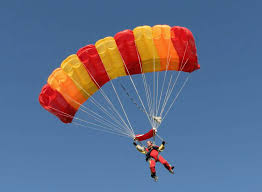记忆方法
将“parachute”拆分为“para”和“chute”。想象一个“chute”(滑梯)有降落伞的功能,即“para”(附加、超出)通常与降落伞的功能有关联,这样就能形象地记住这个单词的意思是“降落伞”。
以上内容由AI生成, 仅供参考和借鉴
中文词源
parachute 降落伞
para-,保护,防御,chute,下降,管道,词源同deciduous.即减弱下降力道的工具,引申词义降落伞。
英语词源
- parachute (n.)
- 1784 (the year the use of one first was attempted, in Paris), from French parachute, literally "that which protects against a fall," hybrid coined by French aeronaut François Blanchard (1753-1809) from para- "defense against" (see para- (2)) + chute "a fall" (see chute).
PARACHUTE, a kind of large and strong umbrella, contrived to break a person's fall from an airballoon, should any accident happen to the balloon at a high elevation. ["Supplement to the Encyclopaedia or Dictionary of Arts and Sciences," Philadelphia, 1803]
- parachute (v.)
- 1807, from parachute (n.). Related: Parachuted; parachuting.
权威例句
- 1. The Parachute Regiment could be forced to admit women.
- 伞兵团可能会被迫招收女性。
- 2. He plunged 300ft to the ground when his parachute collapsed.
- 降落伞突然瘪了,他从300英尺的高空跌落到地面。
- 3. He was almost strangled by his parachute harness straps.
- 他差点被自己的降落伞吊带勒死。
- 4. UN troops could be landed by helicopter or even by parachute.
- 联合国部队可以乘直升机着陆,甚至可以伞降。
- 5. A gust of wind caught the parachute.
- 一阵风将降落伞吹远。
